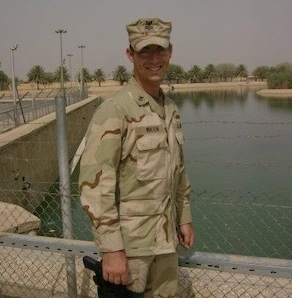“It’s not about me or how I can excel, it’s about what I can do to make others excel.”
Many young adults enter the military following in a parent’s or grandparent’s footsteps. Energy Center Manager Les Walton took that tradition a few steps further than most. His great great grandfather served in the British Royal Navy. His great grandfather served with the American forces during WWI. One grandfather was stationed at Pearl Harbor during WWII. The other served in both the Korean War and the Vietnam War. Walton’s father is also a military veteran and served in both Vietnam and the Gulf War. And the similarities go even deeper – all five generations, including Walton himself, served in the Navy.
By the fifth grade, Walton was already confident that he too would be following the family career path. When asked what he wanted to be when he grew up, there was only one answer.
“My answer was, I wanted to be a Naval officer,” Walton said.
Walton joined the Navy in 1998, midway through earning his college degree. His first assignment was as a lead mechanic with a Naval Mobile Construction battalion, the same job his maternal grandfather had held. He completed 13 months of training to get into the Mobile Utilities Support Equipment Division (MUSE), which provides equipment for temporary utility and critical power systems including power plants, transformers and substations.
Out of 20 total years of service, Walton spent 15 years deployed to places such as Iraq, Pakistan and Afghanistan. But while Navy service is synonymous with time spent aboard a ship in most cases, Walton’s experience was a highly unusual exception.
“One thing about my career is I was in the Navy, but I have never been on a ship,” he said. “I was never out to sea. I got picked up for special programs very early in my career, so I was working in utilities on DOD (Department of Defense) facilities all over the world. I mainly worked with the Marines, the Army and the State Department.”
Walton’s military career briefly crossed paths with Senior Associate Vice President for Administration Paul Odenthal’s in the aftermath of Hurricane Katrina in 2005. At the time, Odenthal was stationed at the Naval base in Gulf Port, MS and Walton was temporarily assigned to the base to provide humanitarian support and help get the local utility services back online.
Walton’s final assignment at the rank of Construction Mechanic Chief (CMC) was as the utilities and energy management director stationed at Camp Lemonnier in Djibouti where he was responsible for water treatment, storage and distribution, two power plants, contract management and over 300 personnel.
Meanwhile, Walton’s father (also named Les) had found his way to OSU after retiring from military service. The elder Les Walton had spent most of his time in the Navy on ships as a boiler operator. When he came to OSU, he started at the now-decommissioned Heat Plant as an operator, eventually becoming the plant supervisor. After 28 years at OSU, Walton senior retired and convinced his son to apply for a job as OSU’s manager of energy operations. The younger Les Walton started in that role in 2022.
Walton humorously remarked that he outranked his father by the time he retired from the Navy and would be his father’s boss today, if not for the elder Walton’s retirement.
“He helped teach me to be better than he was. That’s all we can ever do for our kids,” Walton said.
There are consistent throughlines between Walton’s military career and his current job, both in the day-to-day work and in the unique environment of a college campus. While his role as OSU’s manager of energy operations is a logical extension of the work he did in energy management for the military, he also sees parallels between engaging with students and working with new Naval recruits.
“It’s easy for me to connect with the students here because they are about the same age as a lot of new people who join the Navy that I had a chance to lead,” Walton said.
The students Walton sees at the Energy Center are typically touring the facility as part of their coursework. The Energy Center is a popular field trip for students in sustainability, environmental policy, public health and liberal arts classes.
Walton said that students come in with questions and concerns about how OSU is producing and managing energy. He often fields questions about air pollution and corrects misconceptions about how the steam system that supplies heat to campus actually works.
“I definitely learned how to work with the new generation,” he said. “Understanding what their needs are, how they think. It just kind of came natural to me.”
When it comes to solving problems and functioning as a team in the workplace, Walton believes that military training fosters a certain mindset – one focused on actionable solutions and addressing the root cause of a problem.
“The lack of action leads to stagnation,” he said. “Focus on simplicity. 90% of the time, problems are not complex on their own. The human factor is the driving force behind complexities.”
Walton said that military service taught him a “diverse way to think” and helped him to appreciate multiple points of view. He said that working with different cultures and organizations throughout the world taught him that there isn’t a universally correct way of doing anything. Learning to be flexible and exploring ways to bridge the gaps between perspectives leads to better outcomes.
“It’s not about me or how I can excel,” he said. “It’s about what I can do to make others excel.”
